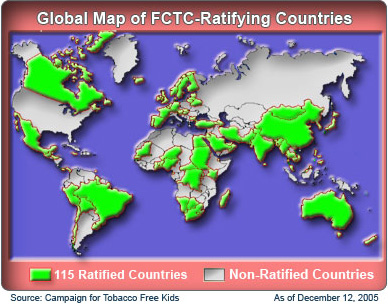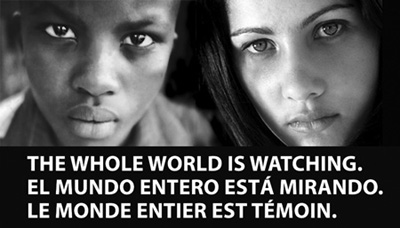
But Implementation Poses Multiple Challenges
WHO’s Framework Convention on Tobacco Control Positioned to Protect Billions Despite U.S. Failure to Ratify
by Clare Dougherty, Director, International Programs, and Ross Hammond, Consultant, Campaign for Tobacco Free Kids, Washington, D.C.

On February 27, 2005, a momentous achievement occurred in global tobacco control: Garnering its 40th ratification, the Framework Convention on Tobacco Control (FCTC) became international law.
Less than eight months later, on November 8, 2005, the same movement experienced a disappointing setback: The United States, the wealthiest and most powerful nation in the world, failed to ratify the FCTC, relinquishing any role in critical policy decisions related to the treaty and taking a back seat in addressing the global tobacco epidemic, the leading preventable cause of death in America today. Ironically, November 8th also marked the 100th ratification of the FCTC, with Brazil and Benin joining the ranks to ensure that two-thirds of the world’s population will benefit from its implementation. As of December 12, 2005, 115 countries had ratified the historic treaty.
[see full article...]Hazardous Hollywood:
Clearing Tobacco from Films Would Avert Deaths Worldwide at Virtually No Cost
by Jonathan R. Polansky, Principal, Onbeyond LLC, Fairfax, Calif.; and Stanton A. Glantz, Ph.D., Professor of Medicine, University of California, San Francisco.

Motion pictures are powerful marketing mechanisms for tobacco. Thanks to U.S. research on the dangers of on-screen exposure, however, the risk posed to young audiences is attracting worldwide attention and compelling action.
Pressure is mounting from all fronts. The World Health Organization (WHO) and major U.S. health groups are urging film industry reforms to prevent future addiction and death. India is pursuing a January 1, 2006 end to tobacco imagery in all films and TV programs produced and seen within the country. And pediatricians, youth and shareowners are lobbying the media giants that own the major Hollywood studios to protect audiences both inside and outside North America.
Research Reveals…
To date, one of the most significant studies to look at the promotional effect of on-screen smoking followed 2,600 New England 10- to 14-year-olds for two years to isolate the influence of movie smoking from all other personal, family and social factors known to predict smoking initiation. Published by M. A. Dalton and cohorts in the 2003 Lancet (362(9380): 281-5), the results showed that 52 percent of smoking initiations in this age group were attributable to exposure to on-screen smoking.